FEATURES

Meet Gillean Opoku, Ghanaian-Australian blogger and founder of Afroklectic

An interview with one of Jobberman.com's founders, Ayodeji Adewunmi
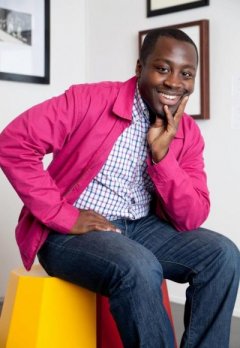
A chat with Larry Ossei-Mensah of
My Global Hustle
Ayoola Akinwumiju, founder of Bigg Ayo Photography, was born in Nigeria but currently resides in Manchester, England. He studied Hospitality Management at the Manchester Metropolitan University. His path to photography came about by accident: “I got a Panasonic Lumix GH1 camera as a birthday gift. I never knew much about cameras, but when going out, I’d carry it with me and try out shots anywhere and everywhere.” Soon, people started telling Ayoola that he took great pictures, so he tried to learn everything he could about his camera. “I would see beautiful images and wondered how I could achieve it.” After a friend recommended he get a Canon 5D MKII, he slowly learned the process of using a manual camera. Then, after realizing that his equipment totaled upwards of £14000, he realized that photography was going to be more than a hobby. He says his inspiration comes from music: “I don’t think I could do anything without music. I love weddings and fashion shoots and this is purely because these occasions are always happy times... moments you want to capture to make others happy. The joy, the smiles, they really are beautiful.” Currently, Ayoola’s fantasy shoot would be a high fashion editorial one in different locations throughout Nigeria. His advice for beginning photographers is to be your best and follow your instincts. “I'm not saying I'm the best, but I'm definitely here to make my mark in the photography world.”
Photography Phix
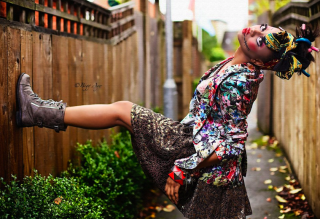

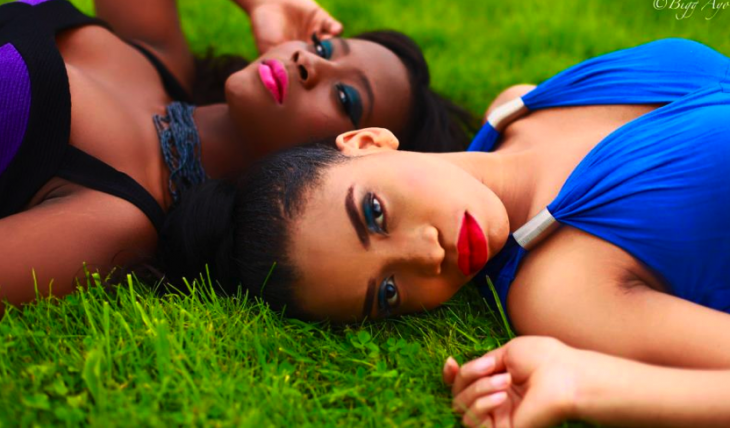


Ayo is a young talented UK based photographer from Nigeria. His Photography is fresh, edgy and effortlessly cool.
Connect with Ayo
1 of 1
Art & Entertainment
The Beast: A Short Story
It could have passed for a movie- one of those action types with the frightening violence, obnoxious red blazes, and mischievous protagonists. But the unsteadiness of the camera and the all-too stable voice of a narrator betrayed its reality. “This... this cannot be happening”, Isi sat motionless as she stared at the repetitive images on the screen. She knew what this would mean. It always meant the same thing.
Growing up in Nigeria, she had been surrounded by people just like her- who bore different versions of her chocolate hue. The distinction that she had known to be of greatest consequence was her personality. When she was young, she was Isi- loud, brash, and inappropriate. At 16, she became Isi- smart, curious, and understanding. The day she moved to England, she was Eesie, the black girl.
At home, where most history was black history, she had been told impressive stories, of what Rosa Parks did on the bus, and what Martin Luther King Jr. said to swollen crowds. It seemed like these people were magicians. With their imaginary wands and gifted speech, they waved racism away with a quick “abracadabra”, freeing the familiar strangers she had always sympathized with from lives of endless torment.
Her arrival to her new home was marred by the unmistakeable presence of prejudice; the nine-lived beast she thought had been forever banished by the freedom- fighters. She felt it in the impolite way the immigration officer ushered her forward in the airport queue; she noticed it in the quickening of a neighbour’s entrance to her flat when she saw this dark-skinned stranger; and almost cried because of it when a brightly- lit cab sped past her wildly outstretched arm.
Since childhood, she had learned to exude the social class that consumed her- through her near-perfect vocabulary, and enviable grooming. Her heritage had been apparent, noted by anyone who witnessed her motions. But here, everything raised questions, and eyebrows. Questions were raised between young girls that sat across her on the subway, eyeing the stitching of her Chanel bag for any indications of a shifty origin. Eyebrows were lifted when chatty shop-workers discovered that this poor black girl was well-educated, and when other bus passengers turned to glance at her and her Nigerian friend as they argued eloquently about politics. This beast, in its constant lurking through the London streets, made her paranoid of every glance and smile she received, searching for a hidden emotion on the faces of seemingly polite strangers.
Her heightened awareness was brought to bear as she sat there staring at the horrific scenes of the London riots. She knew how it had all started, but she also knew how people would see it- as further evidence of the “black man’s dilemma”. She imagined the types of people whose unsavoury judgements were only reserved for the dinner table, that would raise their hands and feel they were proved right. Some of them were probably the ones that would read her submitted applications. The thought of her dreams of being a lawyer becoming any more elusive brought a dampness to her palms and a sickness to her stomach. “It’s hard enough as it is”, she thought to herself.
She remembered the law mixer she had attended. There, two or three young members of every major London firm were present to scope out her university’s talent. Most of them had water bottles close by, prepared for the carnage that awaited them, like seasoned athletes. Isi, along with two hundred or so other students, had come dressed in a suit, CV in hand, and with smart questions prepared. She worked her way around the stalls, regurgitating her memorised questions with a false novelty each time. One answer that seemed to fall into her lap at most stalls like a perfectly ripened fruit was embedded in her mind without her having to take notes. When she asked about the firm’s culture, most of the lawyers said the typical things about it being friendly and supportive. And then, with a near seamless transition, they began to talk about diversity, seemingly picking the speech to suit their audience. They told her about how accepting the firm was, saying that they worked with SEO or Rare, and asking if she knew what these were.
She smiled to herself. Of course I know them, she thought. Those two names seemed to be the only tickets for an entrance by black faces into the exclusive legal profession. An abundance of African and Caribbean students constantly ran to them for safe haven from the beast, but they secretly despaired that these two giants were not powerful enough to protect them all. These giants functioned like auction houses, offering the best and brightest black students to each firm, so that one or two may be chosen.
Isi wished it was different. If she was one of the lucky few, she did not want to be forced to become a shining example of the firm’s diversity- a representative of blackness, as she had been in her Literature class, when the English teacher awkwardly discussed the “ugly masks” of Africans in Conrad’s “Heart of Darkness”. But she could not avoid this- it was the technique that was used to market a false existence.
As Isi drooped further into the sofa, weighted by her emotions, she realised an important truth. She had come to this town ready to give it her all, with her arms outstretched. But they were thrown, with each beastly discovery, closer and closer to herself, until they enveloped her in a protective shell. She felt like a visitor in this place, and she would feel that way until the ugly beast’s ninth life finally expired.
by Ehae Longe of Inktippeddreams
1 of 1
creative writing
Modé studied animation and visual effects at the Academy of Art University in San Francisco. As she studied animation, she fell more in love with the artistic city than the actual courses she was taking. She spent the last two years of her studies painting on the side in hopes of turning it into a profession. Modé’s art celebrates African beauty in an impressionistic style. She does her best not to imitate, as she is a strong believer in unique interpretation. Modé believes that the latter is the purest way to find one’s identity. Modé currently resides in Lagos, Nigeria.

For Modé, her talent wasn’t a discovery. It was a passion she worked hard on mastering. After moving back to Nigeria, she set up her own art studio called Studio of Modé, and is now selling her art out of Terra Kulture, one of Lagos’ premier art galleries. She likes to think of herself as an impressionist painter; instead of copying exactly what she sees, her art captures her impression of it. Now that she has moved back to Nigeria, she is incorporating more of her culture into her art. Her facebook page states that she is “an artist figuring out her place in the world,” but with almost 8,000 fans, it is easy to see that her art appeals to and is appreciated by our generation. She is well known for her iPad skins and cell phone covers, which seamlessly integrate beauty and function for the aesthetically minded tech savvy individuals of the world.
Meet Modé Aderinokun. She is a young talented artist based in Lagos, Nigeria. We interviewd Modé to find out more about what inspires her stunning work.
Artist Spotlight
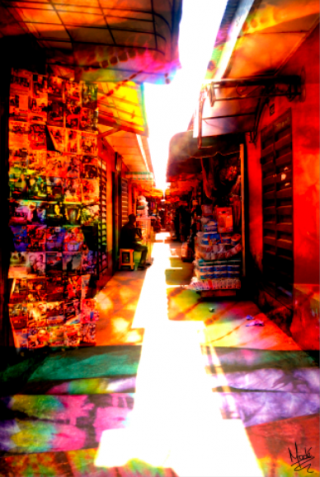
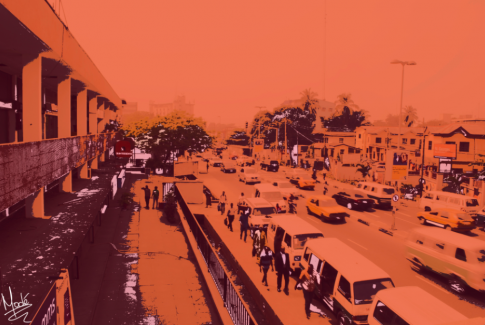
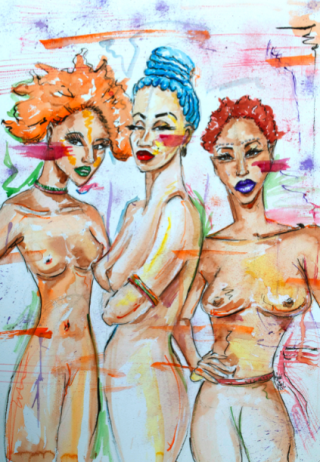

Elegushi Market, Lagos
The Red-Marked Clan
Falomo
1of 1

I went to Ghana because I wanted to get a unique abroad experience and there was a program offered through my University that went to Ghana. The opportunity came about when I was working on campus with a student organization that did fundraising for an orphanage in Ghana. My friend, who got me involved, had been to Ghana a few times and told me about how great it was. I did some research, and all the content I read online spoke of Ghana so highly. I read a few blog posts about girls falling in love with the country and how they want to move back there and live in Ghana as soon as they graduate. When I read that, I knew I had to go! My family thought I was crazy, but they showed great love and support.
When I arrived in Ghana, it wasn’t as different as I expected. I settled in pretty well. I didn’t have that much culture shock. (I had more culture shock when I returned to the US.) I remember being HOT ALL THE TIME. The hardest adjustment was definitely the heat and the bugs. I remember not being able to sleep in the middle of the night because I was so sweaty and I was just itching all over my body underneath my mosquito net. I wasn’t use to all the new foods, but I wanted to taste them all! My favorite local dishes were fufu and ground nut soup. I didn’t expect Ghana to be so Westernized. On my second day, I went to the Accra Mall. I remember thinking, “Wow . . . am I really in Africa right now?!”
I lived in the International Student Hostel on campus during my stay, and had a very nice Ghanaian roommate. The experience of living in a society outside my own was phenomenal. I made a lot of great friends. I still keep in touch with many of them! Some of my friends in Ghana made me rethink my friendships back home because they seemed to be so much more meaningful.
Jeremy went to Ghana for 3 months and opened himself up to an amazing experience in which he learned a lot about himself and an entirely new culture.
Experiencing Africa
My most memorable experience was probably when I made my Azonto video. I was at Medina market dancing Azonto, and a crowd of thirty to fifty people were all watching and cheering. For the rest of the day, as I walked around the market everyone was yelling “Azonto Boy!” at me. Hiplife and Azonto music are still my favorite kind of music!
I love learning new languages. While I was there, I learned a decent amount of Twi, so that was great. And, my Pidgin is proficient. So, towards the end the language barrier wasn’t much of a problem. It was difficult sometimes when I traveled to non-Twi speaking regions, though.
From my experience, I learned to appreciate what I have and to be happy no matter the circumstances. I learned to greet people and be respectful to anyone you come in contact with. I learned that people are meant to help others. I also learned that germs are over rated! My perceptions have changed a lot. I no longer complain about little mundane things that happen here. I’m thankful for having running water, toilet paper, and electricity. I’ve also learned that most people generalize Africa in a way that makes every country of Africa seem like it is the same. I came back and everyone was asking: “How was Africa?!” “What is it like in Africa?!” “What do they eat in Africa?!” I was a victim myself, but most people realize that generalizing one country and referring to it as Africa is very misleading. No one goes to China and says, “Wow! In Asia. . .” You would never ask your friend who went surfing on the coast of California, “What are the waves like in the Pacific Ocean?” I can honestly say I have changed for the better, and it is noticeable. I’ve made so many more friends, I’ve become more popular, I’ve become nicer, more patient, and overall a happier being. I truly believe America would be a significantly better country if more people experience Ghana the way I did.
1 of 1
Society & Culture
insert video here
EXPERIENCING AFRICA
I studied abroad in Ibadan, Nigeria. I chose to go there because I was studying Yoruba in college. Before leaving for Ibadan, I had become highly proficient in Yoruba, as I was already at a 4th year level in my second year of study .
Nigeria has a reputation that precedes it. My Nigerian professors didn't seem to want to scare me off, but they also didn't want to paint a bucolic picture that would prove false upon arrival. Many of my impressions came from the only travel book on the market for Nigeria (the Bradt guide), which suggested that Nigeria can be loud, confusing, and hot, but this chaos also binds the community together and makes Nigerians interdependent even more than many other nations on the continent. I certainly knew that I wasn't going to be having much of a vacation, but I was excited at the guarantee of a genuinely different cultural experience and, sometimes, an adventure. Nigeria is certainly known, also, for being a little dangerous, but that danger is not only blown out of proportion, but is also misapplied. Books and people will tell you about the past dictators and current armed robbers, but the real danger is the traffic. In fact, UW Madison eventually dropped my program a day before I was set to leave over safety concerns. I and my colleagues ended up leaving the university for a year and transferring our credits in.
My first impressions were unfortunately colored by my expectations, but soon those were overridden by the reality of Nigeria. I was incredibly paranoid for about a week, hearing sounds in the night that weren't there, some that were. The first night we arrived in Lagos, a man came to our door in the middle of the night and we were sure he wanted to rob us or do one of the many horrible things I had read in the guidebook or online. Similarly, I heard shouting and loud bangs in the city of Ibadan my first night there and couldn't sleep for fear that angry mobs were on their way to my door. I feel like a complete schizo thinking about my thoughts those nights, but, as I said, I was still trusting the word of westerners instead of my host family and teachers.
I couldn't believe how hot it was. The humidity kept me sweating all day. Having visited Mexico, Costa Rica, and Morocco before, I was still surprised at some of the infrastructural oddities of Ibadan. There would be no traffic lights or signs or lines on the roads, but everyone used cell phones all of the time. I also was not a big fan of Yoruba food at first, but that changed with time. Though I'm a vegetarian, I took a break while I was there and find that I can't help but suspend my own rules when I see a plate of suya in front of me.
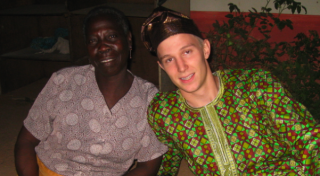
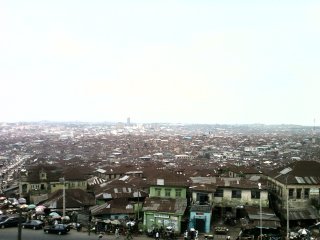
I lived with a professor and his wife. They had had six children, but they all had moved away, so I lived with the neighborhood 'grandma' and 'grandpa.'
We lived in the bottom flat of a three story building on the University of Ibadan campus far from most of the campus buildings. The other families included kids of all ages, some who acted as peers and others and soccer friends. I met one of my best friend from Nigeria, Bimbo Benson, living in that building. I'm afraid sometimes that people will think I'm exaggerating when I say that I could not have asked for a better set of host parents. They had incredible patience with my attempts to learn and adapt to the country while accepting that they could not always understand where I was coming from. By a month in, I felt as though I had always lived there. There may be a lot of stresses that come with living in Nigeria and adapting to a foreign culture, but my experience with Nigerians is one that proves their reputation as some of the most accommodating hosts in the world.
Regarding culture shock, I was more surprised at how different it was to come home. In Nigeria, I could remake myself on some level and knew that my experience and friendships were probably not permanent. When I came home, though, I felt as though there was a life I used to have that I should be fitting back into, but I couldn't. You can't come back from an experience like that and be the person your friends and family remember you as, but you can certainly be better if you adapt the lessons you learned there to the life you live here.
Living in a society outside of my own could be difficult at times, but finding good friends helped. I became very close with some of the students that were there with me, but I also made some very close Nigerian friends that I still talk to. I also felt very connected to my host parents, and it was just as hard to leave them by the end as it was to leave my real parents at the beginning. Sometimes it was hard to see if someone wanted to be friends because they liked me or because they thought they could get something from me. I think most people within the university, though, didn't know what to do with us. I think we had weird accents in their language that almost no one had heard before. I can't say enough about how well my host family fit me into their functions, including the lead up to my host sister's wedding. I unfortunately missed the actual event due to a bout with malaria, but I appreciated the work they put into getting me clothing with the family pattern and driving me around town to meet the extended family. I didn't feel as though I had a huge circle of friends, but I certainly had a family there.
I was in Ibadan to learn Yoruba, so there was definitely a language barrier for the first few weeks. I would say that I was both surprised at how well prepared I was, but also how hard it was to keep up with the things people said. I was going into my ninth semester of Yoruba, but all of that vocabulary didn't prepare me to hear 'O wa nibe' as 'O wa nbe,' as close as they seem. Overall, I was happy at how much I already knew, and also how much I learned about speaking, listening, and using local terms and colloquialisms. We also picked up a number of choice words from cab drivers that you wouldn't want your host mom to catch you saying, and at times, with the traffic in Nigeria, those turned out to be the most useful.
"Though I'm a vegetarian, I took a break while I was there and find that I can't help but suspend my own rules when I see a plate of suya in front of me."
I had so many memorable experiences that it's hard to choose just one. Additionally, some of the most memorable were memorable precisely because they were frightening. For example, the day we arrived in Ibadan, just as we came off of the highway ramp into the market, we heard loud popping: going back onto the highway we had just left was a truck of armed robbers speeding away followed by a Nigerian police truck firing assault rifles at them. Absolutely everyone in the market ducked and we all just looked at each other wondering what we had gotten ourselves into. That turned out to be a one-time experience, though, and every interaction I had with the police after that was incredibly courteous and pleasant. My other memory was sneaking off to Kano. My friend and I had been told in no uncertain terms that we were not to go to the North. This was just after Osama Bin Laden had been assassinated and a month after election riots had turned Kano upside down. We arranged to stay with a Couchsurfer in the city, announced to everyone that we were heading to Abuja for a week, and promptly boarded a bus to the North.
Finally, Nigeria taught me to stop worrying about what others think about me as I would stick out no matter where I was in the country.
It seems like we in the United States try to pretend around a lot of minor cultural taboos, but Nigerians will do what makes sense. Free cans of soda at the party? Bag a couple up and take them home. Feel like sleeping at a long meeting? Just do it.
I miss the constant adventure that walking out of my door was every day. I also miss greeting people that I saw on a regular basis while walking to school or buying food. Tangential relationships rarely exist in the US, but in Nigeria, they abound. I also miss getting extremely cheap food being made over an open fire and eating it under a tree. I miss how much value I put on things like getting food I liked, or playing a game of soccer with other students. Sometimes I even miss the smell of thick diesel smoke in the air as I'm walking down the side of the road. I miss the absolute insanity and cacophony out in the city, and yet other times I am happy to have so much peace and silence when I want it. I miss the kids knocking mangos off the trees with their long sticks.
I don't miss the sometimes maddening attention that my presence would draw in most situations. I also don't miss people trying to price gouge me because they profile me. I don't miss the Jurassic-sized cockroaches or the hour and a half of prayers and introductions that prefaced even the smallest meetings. I don't miss power outages or drinking all of my water out of plastic bags. I don't miss hand washing all of my clothes. I really don't miss malaria.
My advice for students studying abroad in West Africa is "DON'T OVER PACK". I came with a hiking bag and a backpack for nine months and there were still things I don't think I needed. Others checked two bags and packed toiletries for nine months. If you need something there, then obviously it will be sold there. I also encourage students to try to learn outside of the classroom. I learned more about Yoruba language and culture running around the city and jumping into cabs than I ever did in the classrooms.
I spent over a year in Nigeria and my little taste of Africa has only increased my appetite. If I had to sum up my experience in three words, I would say that my time in Nigeria was "hot, unpredictable and real".
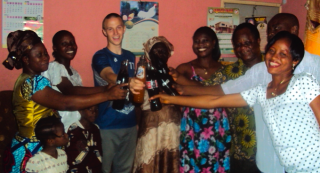
The bus took all night to get there, simply stopping on the road for a few hours round 3am, but playing ABBA's greatest hits the entire night. I will never forget trying to sleep in a bus seat somewhere outside of Kaduna as our driver is setting up his prayer mat on the road outside and Dancing Queen is playing at three in the morning. We ended up traveling all over Kano and seeing some amazing sights like 500 year old dye pits and magnificent mosques. I was glad that I had the chance to travel outside of Yoruba land and see some other parts of the country.

1of 3
2
I went through all of the classic steps of culture shock, but I felt as though I dealt with it fairly well. The first few weeks were a honeymoon with the country. Everything I saw and did was absolutely new. Over time, though, some things wore on me.
I'm not sure we ever met another Oyinbo that spoke anything past Yoruba greetings. I enjoyed this because it lent the whole experience and level of foreignness and adaptation to being a minority, albeit a privileged one. This, though, also meant that we really, really stuck out. After a while, being shouted at everywhere you went got old and sometimes stressful if we were trying to get something done at the moment. Eventually, though, you just get used to it and appreciated the random conversations you can have with people around the town.
My family thought that going to Nigeria was a good idea, but I think they were worried about safety a little bit. There is no way they would have even asked me not to go, I think they were just inwardly nervous about my safety. Afterward, they have agreed wholeheartedly that it was an incredibly valuable experience to have.
"It seems like we in the United States try to pretend around a lot of minor cultural taboos, but Nigerians will do what makes sense."
2 of 3
3 of 3
Society & Culture
Keegan studied abroad in Ibadan, Nigeria for over a year to study Yoruba. Whilst there, he immersed himself in Yoruba culture and learned a lot about Nigerian society as a whole.
Keegan with host Mum
Keegan with host family
Ibadan
We did a little Q&A with Wani Olatunde of Wani Olatunde Photography. Her images, which range from intimate family portraits to wedding and street photography, speak volumes about her artistry.
Tell us a little about yourself?
Ooh, what do you need to know about me? I'm a professional wedding and lifestyle photographer based in Lagos, Nigeria. Although my business is primarily shooting weddings and portraits, I love watching and observing people, so I do love my street photography as well. I'm a Nigerian, German, Scottish melting pot and I spent my formative years in the UK, which I still consider home. I have a Masters in Electronic Engineering and was an investment banker for over 6 years working in the UK, South Africa and Nigeria. I am very excited and humbled to now be able to pursue my passion, which is of course, photography.
How did you get into photography and how many years of experience do you have?
Photography has always been in my life - my dad made me the official family photographer when I was around 10 years old giving me his beloved Minolta film camera, which I guess was a huge vote of confidence. Travelling to beautiful countries like India, South Africa and Thailand further spurred my interest in photography. I would say I gradually made the transition from ardent hobbyist to professional photographer over the last 3 years.
How did you master your craft?
I definitely wouldn't say I have mastered my craft as there is always something new I can learn. However, I am a sponge when it comes to photography, I attend workshops, online courses, buy educational books and network with other photographers in order to continue to grow as an artist. Most importantly, I am constantly shooting in a range of environments and lighting situations, which I believe is the best way to learn. The legendary fashion photographer Helmut Newton said: “The first 10,000 shots are the worst” and it excites and motivates me to know that although my images today are better than yesterday, they are going to be even better tomorrow.
What kind of camera/lenses do you use?
I am a Canon girl - it was the first DSLR camera I bought and I love it. I use a range of lenses depending on what I'm shooting but my go to lens is the 50mm f1.4. I'm saving up for the Canon 5D MK III and 50mm f1.2 but I'm hoping that if I drop enough hints, friends and family will contribute towards the cause - it's worth a try.
When did you realize that photography was more than a hobby?
My love for photography is something that has grown the more I shoot. When I realised that I was spending every spare moment studying and thinking about photography, it occurred to me that this might be something I wanted to do professionally. I became a weekend shooter, so effectively working two jobs and then finally this year, I was fortunate enough to be able to go full time and I have truly never been happier.
How would you describe your aesthetic, where does your inspiration come from?
I am still figuring out my style but I am drawn to beautiful, emotive, evocative imagery and this is what I seek to create with my wedding, portrait and street work. It's amazing the unexpected places you can find beauty if you really set your mind to it. Initially my inspiration came from other wedding and portrait photographers but now I am starting to look at other types of photography and art forms to really try and discover who I am as an artist.
What are your favourite kind of photo shoots and why?
It depends on the genre of photography I'm shooting. For weddings, I love the couples session just after the ceremony. The couple look amazing, they are in their own little love bubble and can't keep their hands off each other. It really is an honour to be able to capture these sort of moments that will help my couples relive their wedding day every time they look at my images.
Describe your fantasy shoot?
Oh wow - a million ideas race through my head. I am not a fashion photographer but I am looking to do more fashion inspired portrait work. So I would want an amazing team consisting of a stylist (Rihanna's or Blake Lively's would do), makeup artist and hair stylist. I would want a limited access location such as the Taj Mahal and then a stunning couple who are comfortable in front of the camera (Brangelina would be acceptable). I would shoot at sunset, so there would be lots of colour, lots of drama and simply stunning imagery. Never say never!
What is your end goal with photography, where do you hope it takes you?
I haven't decided on an end goal quite yet since I am pretty early on in my photography career. Ultimately I think I may want to become an international destination wedding photographer as this would combine my love of travelling with my photography but only time will tell.
What is your advice to beginning photographers (are there any resources you would recommend)?
The most important piece of advice I can give to any amateur photographer is to learn the basics of photography in terms of the exposure triangle and the basics of lighting etc. This will allow you to take control of your photography and understand how to get the image you want in any environment. I can highly recommend the book "Understanding Exposure" by Bryan Peterson, which gave me a lot of "a-ha" moments and completely transformed my photography. In terms of online resources, there is an endless list but two of my absolute favourites are Digital Photography School and Elizabeth Halford Photography.
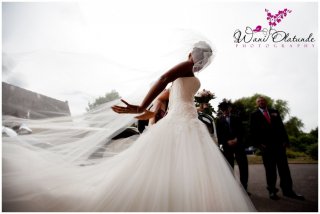
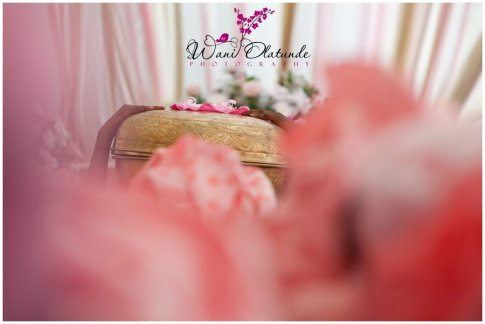
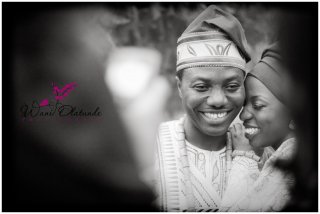
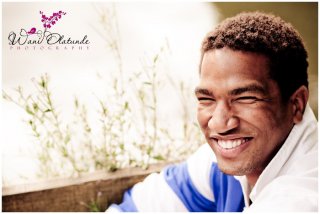
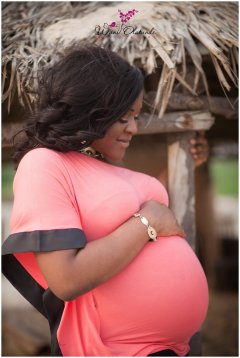

1
Photography Phix
1of 1
Connect with Wani
Art & Entertainment
Back Next
 Magazine Posts
Magazine Posts Table of Contents
Table of Contents